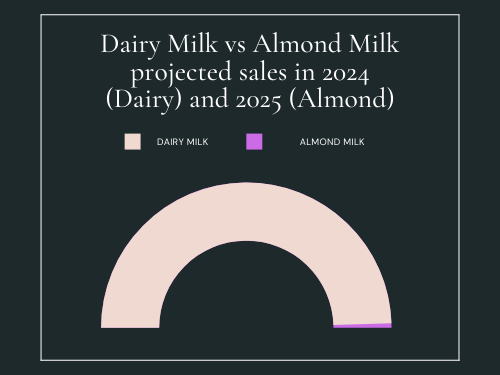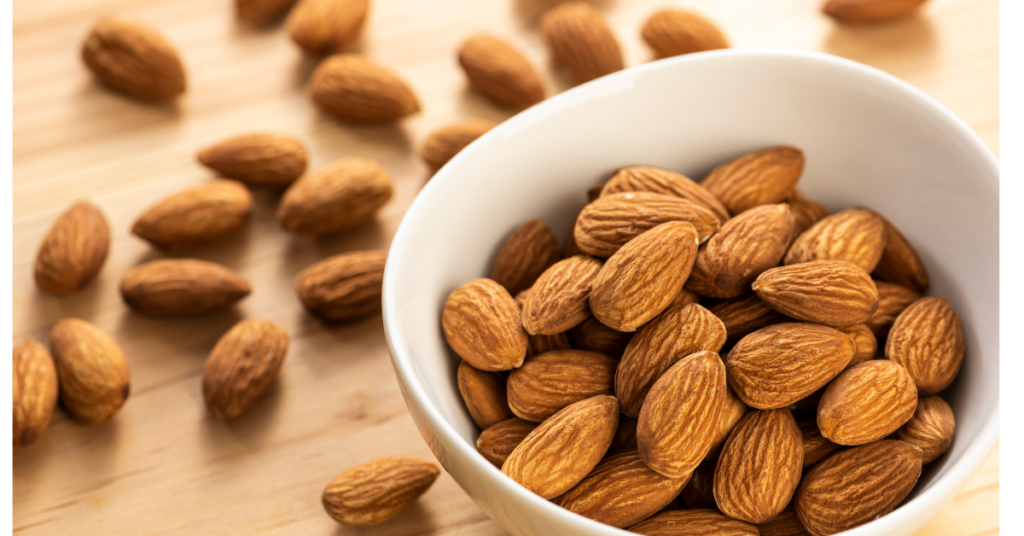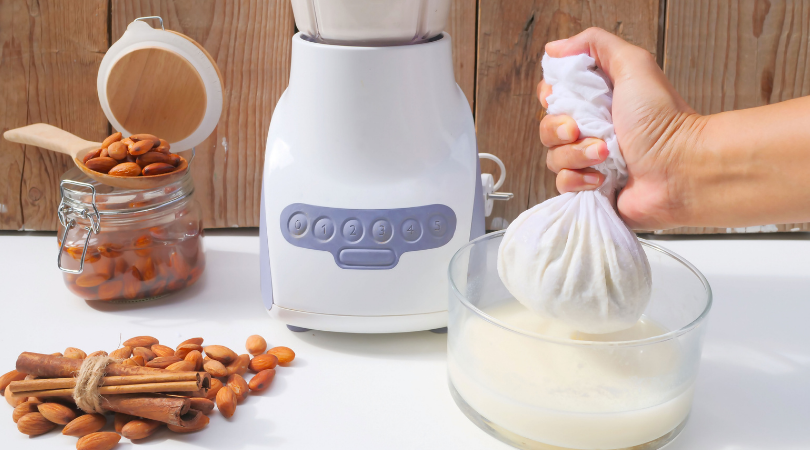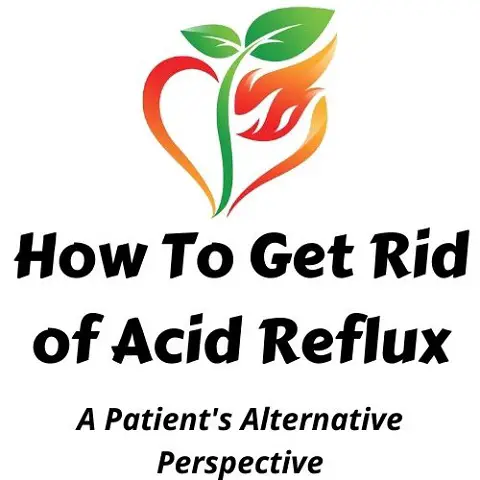Any links on this page that lead to products on Amazon and other companies may be affiliate links and we earn a commission if you make a qualifying purchase. Thanks in advance for your support!
You may be looking for alternatives to cow’s milk to help to calm your heartburn or gerd – alternatives such as almond milk – but is almond milk good for gerd? Read on below to find out more.
Almond milk may be good for your gerd, but there is no scientific basis for this. As it is low in saturated fat, it may help to prevent acid reflux in the first place, but it may be no better than ordinary skimmed milk. Almond milk is slightly more alkaline than ordinary milk, and may therefore help with silent reflux or LPR.
What is Gerd?
Acid reflux or gerd (Gord in the UK) is a common condition, affecting millions throughout the world, that describes the presence of gastric acids in the esophagus, or food pipe, which adversely affect the esophageal lining. It stands for gastroesophageal reflux disease (US) or gastro-oesophageal reflux (UK and elsewhere).
Common symptoms are heartburn or a pain in the chest (a common heartburn symptom, but check with your physician any unusual chest pains), or the feeling of regurgitating food which you’ve recently eaten. More acid reflux symptoms can be found here.

If it persists, or is a regular occurence, it is known as Gerd or Gord. You should visit your physician if it occurs often, as it can sometimes – in rare cases – result in esophageal cancer. In any event the effects of stomach acid in the food pipe can be serious.
There is general agreement that certains foods, for example spicy foods, cause or exacerbate gastroesophageal reflux disease and irritate the digestive tract. The common element is a relaxation effect in the muscle at the junction of the stomach and the esophagus, called the lower esophageal sphincter (the LES), resulting in acid reflux symptoms.
Spicy foods are also thought to irritate the stomach lining, but there seems to be no direct link between that and acid reflux.
Acid reflux sufferers often turn to alternative remedies, such as almond milk, to at least relieve their symptoms.
What is Almond Milk?
Almond milk is a popular dairy alternative made from almond nuts and water, and can often be found flavored with vanilla or chocolate. It is sold unsweetened or sweetened, and is often fortified with various nutrients.
Many people believe almond milk confers a health benefit over regular milk and is a natural remedy for gastroesophageal reflux disease. But is this the case?
Which Is More Popular: Cow’s or Almond Milk?
Nielsen data shows that sales of nondairy milks have grown by 23% in the last four years. Due to increased health consciousness among consumers, healthier alternatives such as almond and soy milk have gained popularity.
Almond milk sales reached $5.8 billion in 2018, and are projected to reach $13 billion by 2025. This contrasts, though, with the projected sales of dairy milk, which are expected to reach a massive $1032.7 billion by 2024. Almond milk sales only represents 1.2% of this total, as shown in the following diagram:

Is Almond Milk Good for Gerd?
Many studies have shown how good almonds are for health, including regulating body weight, and protecting against diabetes, obesity, metabolic syndrome, and heart disease.
However, there is fat in almonds, which could have a negative effect on gerd. There are about 14 grams of fat in a typical serving of almonds, consisting primarily of more healthy monounsaturated fats and omega-3 fatty acids.
In a 2005 study, high dietary fat intake was associated with an increased risk of gastroesophageal reflux disease symptoms and erosive esophagitis (a condition resulting from gerd).
Studies on volunteers have shown that when we eat a lot of fat, the sphincter at the top of the stomach relaxes, making it easier for food to pass from the stomach through and into the esophagus or food pipe, causing acid reflux.
So drinking almond milk may not be as good as, say drinking skimmed milk from that point of view, as skimmed milk has little or no fat.
But anything which reduces our fat intake should be good for gerd. High-fat foods relax your valve at the top of your stomach and are slower to digest than other foods. When food sits in your stomach longer, your body responds by increasing acid production. Fried foods like onion rings are obvious culprits, but meats like prime rib or bacon, and whole milk dairy products also cause symptoms. (gastroconsa.com)
Almond milk is generally lower in saturated fat content – the bad sort – than ordinary, non skimmed, milk. Skimmed milk has very little or no saturated fat. So almond milk is good for gerd, in theory, and should not make your reflux worse. However, in practice, there have been no studies to date which establish a link between almond milk and a lower incidence of gerd.
A full comparison of the nutrient composition of dairy and plant milks can be found here.
Is Almond Milk Good for Laryngopharyngeal Reflux (LPR)?
But what about a specific form of gerd called laryngopharyngeal reflux (LPR), often called “Silent reflux”? It is gaseous reflux which infiltrates the airways. It produces symptoms which include a persistent cough, hoarseness, nasal drip, asthma, and a dry throat.
One controversial treatment for LPR is the low acid diet, which basically advocates the consumption of low-acid foods and drink and alkaline food and drink. This is NOT the alkaline diet which claims to “balance” the body’s acidity, but rather the method promoted by Dr Jamie Kaufman and Dr Jonathan Aviv in their respective books, “Dropping Acid: The Reflux Diet Cookbook & Cure” (in the UK it can be found here) and the Acid Watcher Cookbook (UK here).
This approach is based on the research which demonstrated that acid in food as it goes down the food pipe causes damage to the esophagus, similar to that caused by digestive juices coming up, and even making heartburn worse. That’s why eating low-acid foods as part of a healthy diet
helps reduce any acid damage in the food pipe and throat.
According to “The Acid Watcher Cookbook”, certain shop bought types of Almond milk, having a pH of around 8 – ie it’s alkaline – will not damage the esophagus and assist with the healing.
Is A Handful of Almonds Good for Gerd?
In theory, if a glass of almond milk is good for gerd, than eating almonds should be too. As one commentator on Quora said:
” almonds are absolutely my safety snack. Specifically whole raw natural ones, nothing added. I keep a big bag around because snacking on a handful always seems to help curb an episode of my GERD/LPR. And as someone who’s biggest trigger food is dairy, almond/soy/oat milk are lifesavers for me.”

Here are some other popular questions about almond milk:
Is Almond Milk Dairy?
No, almond milk is not dairy. It’s not been near a cow! This is especially important for people with a lactose intolerance.
Is Almond Milk Lactose Free?
It contains no lactose.
Is Almond Milk Good for Weight Loss?
There is some evidence that almonds may help reduce appetite. A small study published in The Journal of Nutrition showed that eating almonds before meals reduced hunger pangs compared to people who ate nothing beforehand.
Plus, they were less likely to overeat later on. But this effect seems to disappear after just one week.
However, another study published in Obesity Research & Clinical Practice suggests that consuming nuts regularly does not lead to weight loss over time.
In any event, almond milk has fewer calories than dairy milk, so unless you’re drinking skimmed milk, almond is the better alternative.
Is Almond Milk Gluten Free?
Yes, almond milk is gluten free.
Does Almond Milk Have Any Nutritional Value?
Almonds contain lots of healthy fats, vitamins, minerals, fiber, protein, antioxidants, phytochemicals, polyphenols, flavonoids, amino acids, enzymes, omega-3 fatty acids, magnesium, calcium, potassium, zinc, iron, copper, manganese, phosphorus, selenium, iodine, vitamin B6, folate, and niacin.
Almonds are actually an excellent source of plant-based proteins.
Is Almond Milk Bad for the Environment?
Almond milk has one of the lowest greenhouse gas emissions. It also uses less land than dairy milk. However, the water required to make almond milk is higher than that of any other dairy substitute.
They can be grown without pesticides or herbicides, too. And unlike meat production, there aren’t any methane gas emissions associated with growing them.
So if you want to eat something good for the environment, try almonds instead of beef.
What Are People Saying About Almond Milk and Gerd?
Generally, comments on the web are very positive about whether almond milk is good for gerd. For example, here are some reactions on the web:
Yes! Almond milk/Almonds are alkaline in nature which means a neutralization reaction takes place with the stomach acid relieving symptoms of heartburn, GERD, or acidity”
Quora
.
“Yes. I can’t recommend it enough”
Quora
Gerd may be reduced because of a reaction to ordinary milk ie a dairy allergy, not as a result of the positive benefits of drinking almond milk:
“I had GERD that was severe enough to cause chest pain that led to the GERD diagnosis. In an unrelated sequence of events, I realized that I had a dairy allergy, so I stopped all use of dairy products. I also noticed that my GERD went away and hasn’t returned.”
Quora
How Do I Choose The Best Almond Milk?
Look out for iodone and vital minerals such as calcium, phosphorous, sodium, potassium, magnesium, and Vitamin D on the label.
If possible, choose organic varieties because conventional ones tend to use artificial ingredients which could affect the nutritional value of the final product.
Also look out for unsweetened almond milk as this will cut your sugar intake. There are natural sugars in the milk.
In the US, a popular, highly rated brand is Mooala, which can be found here.
I buy a brand which only has three ingredients – almonds, spring water and sea salt. It is an unsweetened almond milk, and can be found in the UK here.
Can You Make Almond Milk?
You certainly can, and you don’t need large amounts of almonds. You’ll need two cups of raw unsalted almonds, 2 cups filtered water, 1/2 cup maple syrup, 3 tablespoons vanilla extract, and 4 teaspoons lemon juice.
Blend all ingredients together until smooth. Then strain through cheesecloth or fine mesh strainer.
Store your homemade almond milk in airtight containers in the refrigerator up to 7 days.

In Conclusion
Almond milk is a great option for people who suffer from digestive problems like gastroesophageal reflux disease. It’s low in saturated fat, easy to prepare and tastes delicious. Plus, it doesn’t require refrigeration, making it perfect for hot summer months.
However, while it might help relieve those uncomfortable gerd symptoms, it won’t cure them, unless the cause of your acid reflux is associated with a reaction to dairy products. There is no scientific basis for concluding almond milk is a cure for gerd.
That said, many people find they prefer this type of drink over traditional cow’s milk. If you’re looking for a healthier beverage, then give a glass of almond milk a go.


